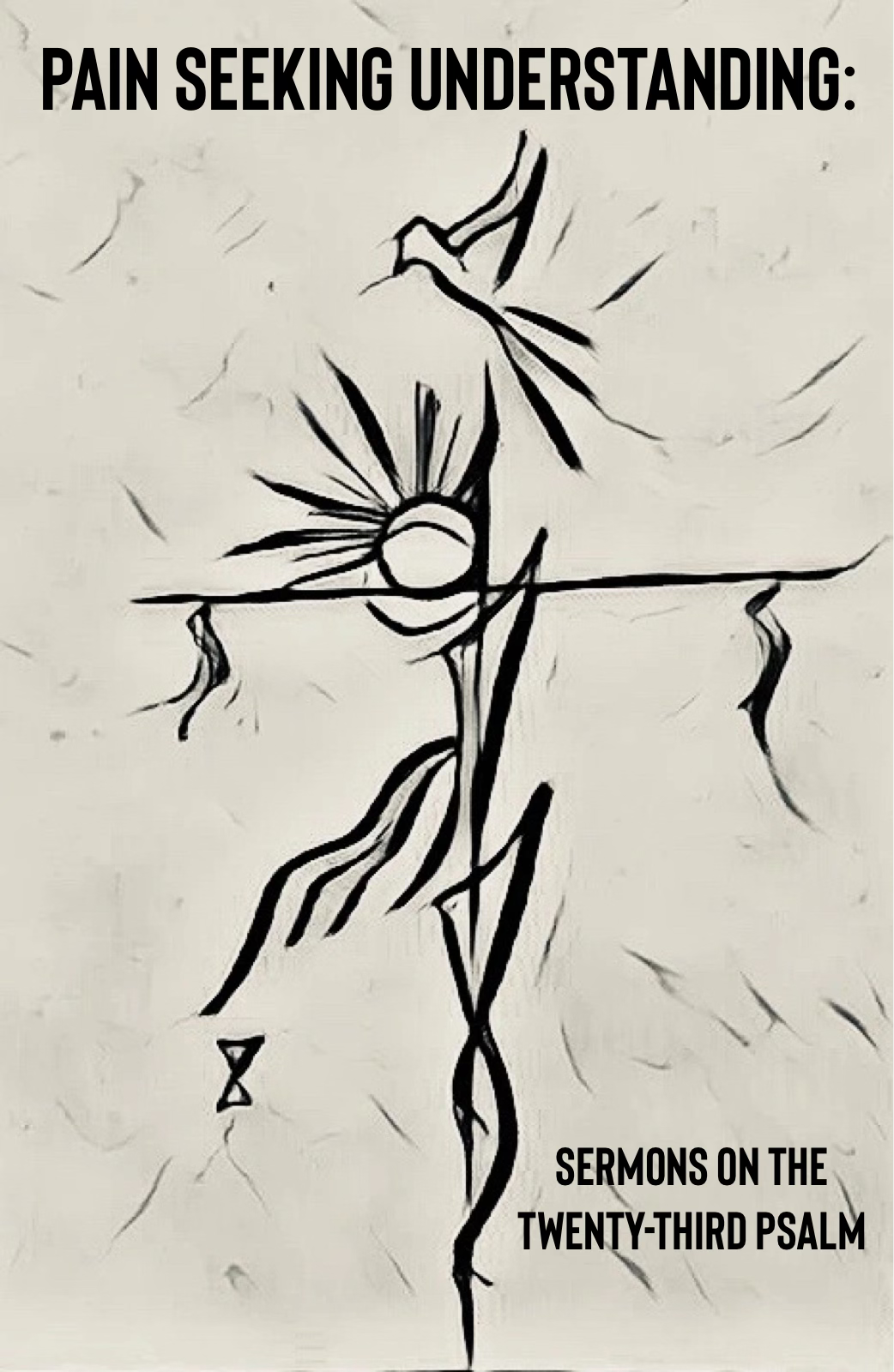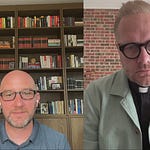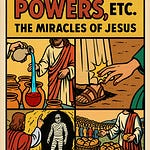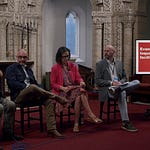I closed out our sermon series on the twenty-third psalm this morning. Blame it on the chemo brain, I misplaced the last half of my sermon manuscript. The text below therefore does not match up with the audio. Just in case anyone was bothered by the discrepancy! Apologies to Josh Retterer who labors as my editor gratis.
Transfiguration — Psalm 23
After I graduated from seminary, I worked as a chaplain in the Children’s Hospital at the University of Virginia. One night I was on call, attempting to catch some sleep by lying on top of a conference table in a dark office. It had been a busy shift. My hands reeked of sanitizer from visiting so many patient rooms. I was laying on the table, when my pager went off just after three o’clock in the morning.
It summoned me to a delivery room.
“The family is requesting a baptism,” is all the nurse managed to tell me.
The couple were from West Virginia. The husband— the Dad— was wearing a blue and yellow Mountaineers hoodie. A woman I intuited was his mother-in-law was sitting in the chair beside the bed, patting her daughter’s shoulder. She was wearing the pajamas she’d had on when she got a the call not much earlier than me. The mother was holding her swaddled, stillborn daughter in the crook of her arm, shushing her and smoothing her few fine hairs with her hand.
She turned her gaze from her daughter.
“We’d like you to baptize her, “ she said.
“Of course,” I mumbled nervously.
I fumbled about for a moment or two, finding a clean bed pan and a pitcher to fill with water. Slowly pouring it into the bed pan, I invoked the Holy Spirit so that the water might be a cleansing washing and a saving flood— a different sort of labor and delivery.
Then I took the tiny child and rested her in my arm.
I don’t remember their names, but after all these years I do remember hers.
I looked at her parents and asked, “What name is given this child?”
“Megan,” the girl’s mother spoke, “We want to name her Megan.”
And I looked down at her calm face, still splotchy from birth, and I said, “Megan, I baptize you in the name of the Father, Son, and Holy Spirit.”
Three times I cupped my hand, scooped it up, and watched her tiny hair wave in the water. Then I handed her back to her mother, pulled out the little vial of oil I carried in my pocket, dabbed my thumb with it, and anointed her forehead with the sign of the cross.
“Megan, receive the Holy Spirit,” I pronounced.
And then Megan’s Mother looked up at me, “Preacher, can you read the Twenty-Third Psalm for us?”
Oblivious to the looming danger, I pulled my pocket Bible from my lab coat and turned to David’s prayer. The grandmother clutched my hand like she was standing at the end of a plank. I read.
All was good— until I got to the final verse, “And I will dwell in the house of the LORD my whole life long.”
Before I could get the amen out, Megan’s grandmother shot me a question, “What the hell was that?!”
“Um, it’s Psalm 23— like you wanted.”
“No it ain’t,” she replied, “We wanted to hear the dwelling in the house of the LORD forever one.”
“This is the New Revised Standard Version,” I replied limply.
And then she smacked me across my face, “How dare you take away their hope!”
I was about to apologize, save face, but she interrupted me, “God didn’t even let King David build that Temple in Jerusalem! Why in the hell would he be praying about the Temple? Don’t you know the scriptures?! I thought you were a preacher! Are you saying it doesn’t promise forever?!”
In the Gospel of Mark, Jesus leads three of his twelve up to the top of Mount Tabor wherewith, without preamble or announcement, the LORD unveils to them the true identify of Mary’s boy and Pilate’s victim. “Jesus was transfigured before them,” Mark reports. Just as Christ’s crucified body is the lamp whose uncreated light cast shadows in the valley of death, Peter, James, and John see Jesus ablaze with the kabod YHWH— the glory of the LORD. In other words, there is one who is other from God but is simultaneously God— a second divine identity.
Thinking they have trespassed upon majesty, the disciples react in terror. Peter is so scared he cannot keep from speaking, offering to construct a House for the Lord atop the mountain.
Neither Jesus nor Moses and Elijah respond to Peter.
Instead God the Father answers.
The Cloud of Presence, which had accompanied Israel through the wilderness day-by-day for forty years, appears and covers their eyes from the glory too luminous to behold. The cloud that is God’s presence surrounds the disciples. Likewise, at the conclusion of his prayer, David finds that for all of his life, across the entirety of his experiences, he has been surrounded by God.
Admittedly, this is not obvious in the English.
As Old Testament scholar Richard Briggs gripes, the final verse of the twenty-third psalm is the most consistently mistranslated portion of David’s prayer. For starters, the verb of the first two subjects (“to follow”) is an especially weak translation of the Hebrew verb rādap, which means to pursue, to chase, to go after, or to hunt down. Follow makes it sound like goodness and mercy can barely keep up with you; quite the opposite, you are the object of their determined questing.
Moreover, the two subjects of the verb, goodness and mercy, are not generic nouns for prosperity and pardon. The first noun in Hebrew is ṭōb, as in, “The LORD commanded, “Let there be light,” and there was light. And God saw that the light was ṭōb.” Good— good for the covenant. The second noun in Hebrew is ḥesed. When the LORD renews his covenant with his people after the exodus, he appears in a pillar of cloud and pledges to Moses, “The LORD, a God merciful and gracious, slow to anger, and abounding in ḥesed.”
Steadfast love.
Tov and Hesed.
These are not generic adjectives. They are covenantal nouns. They are attributes of God. And, as Thomas Aquinas notes, because there is no distinction between God’s attributes and God’s very self, when David takes his gaze off the path in front of him and looks over his shoulder, he professes that he is being pursued relentlessly by God. Which is a straightforward enough confession of faith except of course for the fact that the Shepherd is also simultaneously in front of him, leading him.
God is both bow and stern, fore and aft.
What Mark shows you on the Mount of Transfiguration is nothing more mysterious than what David invites you to pray in this psalm.
God the Shepherd is in front of David, guiding him.
And One who is other than God but is also identifiable with God is at one and the same time behind David, like a sheep dog, driving him to the Shepherd’s chosen destination.
In other words—
From tranquil waters to the valley of death’s shadow, from the presence of enemies to the persecution occasioned by his oily anointing; before him and behind him, all this time, all along, always— even on his worst day; even if he doesn’t realize it until he turns to look back— David has been surrounded by God. David has been both led and pursued by God— by the stubborn if inscrutable tov and hesed of the triune God.
Four weeks ago, I preached for the funeral of a friend. Sam was my favorite old guy in my former parish. A fellow aficionado of standup comedy, ten years ago Sam escorted me and my fifth grade son to a Lewis Black show at the Warner Theater. Lewis Black may be explicit in his vocabulary and hyper-partisan in his politics but he’s a relatively clean comedian. Thus, Sam said he felt comfortable bringing along a boy who probably should have stayed home and watched the Magic School Bus.
But for the show at the Warner Theater, Sam hadn’t factored the opening act into his expectations. I don’t recall the name of the comedian, but I know that he had a ukulele and that his first bit was a song about Gwyneth Paltrow’s…let’s just say it rhymed with regina. After the fourth verse of the song, Sam leaned over my son Gabriel and whispered into my ear, “Don’t tell my granddaughter about this.”
When I met with his children to plan his service of death and resurrection, his daughter said to me:
“Over the years, Daddy had a lot of hard, trying times. The two wars, Korea and Vietnam, left him with scars beyond healing and nightmares without consolation. My mother’s illness exhausted him. And then the strokes and all that rehab. But when he looked back on his life— Daddy told me so just before he lost his power to speak— all he could see was the hand of God.”
If the final lines of David’s prayer are the most consistently mistranslated of the psalm, then the modifier at the beginning of verse six is but another instance of an interpretative stumble. Often translated as “surely,” the Hebrew work is ʾak. The modifier is both intensive and restrictive. It means not surely but only.
Only goodness and mercy are in pursuit of me.
Just as the Shepherd is before me, only God is behind me, questing after me.
Astonishingly— offensively, perhaps— David looks over his shoulder and back on his life and confesses that he can see the goodness and the steadfast love of Jesus Christ in every single circumstance of his life.
As Old Testament scholar Dale Ralph Davis summarizes the verse, “The expression is remarkable. There is a certain chemistry in believing faith that can combine brute facts with buoyant faith.” Or, as David prays in Psalm 119, “You are good and do good.”
Only good.
God’s goodness and steadfast love have you surrounded.
Of course, most renderings of Psalm 23 hedge. Instead they read surely not only. They do so, quite simply, because modern translators balk at affirming what the scriptures so straightforwardly attest; namely, God is the will which wills in all things.
Providence is the word Christians use for this hidden, ordered provision guiding our lives and all of history to God’s desired End. “All things are subject to divine providence, Thomas Aquinas writes, “not only in general, but even in their own individual selves.” Absent the Lord’s hand, the whole universe would be meaningless. Lacking all order, it would have no rationale or telos. Apart from God’s providence, the very act of prayer would be pointless.
As Robert Jenson explains the stakes in the psalm’s closing claim:
“Behind all the nihilisms of modernity is the vision of our world as a deaf and dumb apparatus, within which we live but to which our converse is irrelevant.
We have turned our society and our individual psyches into alien and silent prisons. In its participation in this self-alienation much of the American church has become simply unbelieving, disguising its abandonment of faith by doing other things— meditation, self or group therapy, activism and community organizing etc. and calling it Christianity. Our “progressivism” and “conservatism” are but the atheist branches of the same capitulation before a dead universe.
And it is all a delusion.”
If everything is not within the LORD’s providential grasp, God would be unable to save us. Either God’s providential love has us surrounded, leading and pursuing us. Or our redemption is in jeopardy.
Thereupon David’s prayer raises the inevitable question. Does the LORD’s providence exclude our personal willing? Quite the opposite. After all, David’s assault against Bathsheba trespassed the LORD’s will for David, but they did not permanently interrupt God’s providential guiding and pursuit of him.
David is neither a pawn nor an automaton.
As Jenson explains the dynamic of divine providence and creaturely will:
“The history God is making with us has the freedom of a good story, and it is a freedom that is there even for the Father and the Son, and therefore is a story full of turnings and detours. As we live in that story, we may be sure of the character of its outcome, but we do not know where God may be hiding around the next corner.”
And then to illustrate his point, Jenson points to the Parable of the Good Samaritan:
“The Samaritan does not expect a beaten-up Jew in his way nor the Jew a Samaritan benefactor. [After he has providentially arranged their encounter] the one hiding on the side of the road to see what will happen next is God.”
God is waiting to be surprised by what we do next.
Just so—
Faith in God’s providence does not nullify our works or our willing.
Faith in God’s providence begets perseverance.
“Providence,” my friend Brad East writes, “is a secret whispered from one martyr to another until the end of time.”
He continues:
“Providence, in short, makes a promise. It says that your life may sometimes seem like one long crucifixion, but at the end of it lies an empty tomb. A belief in providence takes God at his word no matter how dark life becomes.”
Providence takes God at his word.
Which word?
“The LORD your Shepherd is in front of you, and only tov and hesed— nothing else— are chasing after you.”
No matter how life looks, the three person’d God's got you surrounded.
A few days after I baptized Megan, her parents made use of the business card I’d stuffed into their go-bag. They called me. Despite what her grandmother may have thought about me as a priest or a preacher, the family had neither to bury their baby.
And so the following week I followed 64 West across the border to a graveyard near Summersville, West Virginia. In the place where a headstone later would be placed, the parents had pressed into the soil a photograph of themselves with Megan, holding her in the delivery room. You could not tell from the picture that anything was amiss in the world.
Casting earth upon her tiny casket, I commended her to the LORD, saying from the Prayerbook:
“Into your hands, O merciful Savior, we commend your child Megan. Acknowledge, we humbly beseech you, a sheep of your own fold, a lamb of your own flock…Receive her into the arms of your hesed.”
By way of benediction, I read the twenty-third psalm— the “forever in the house of the LORD” one. Afterwards, as we walked back to our cars, Megan’s grandmother said to me, “Thank you for praying the right version, preacher.”
I smiled, “I think it’s a distinction without a difference.”
She crinkled her brows like I had uttered nonsense.
I said:
“Think about it. The LORD disallows David from building the Temple because God wants to remain in the Tent of Meeting until he guided history to the appropriate point for his House to be built. David knew— a God so in command of our lives…you might as well pray in the here and now as though the promised future has already happened.”
Again, she just started at me, still skeptical of the groggy, rookie chaplain she’d seen at work in the delivery room.
“Think of it this way,” I tried, “Pray right now like you’re already playing in the Father’s House with a toddler named Megan. Because the LORD is after us and there isn’t a damn thing that’s ultimately going to keep God from getting what he wants.”
Then she grabbed ahold of me and cried tears that were not altogether sad.
A month or so after we buried her, Megan’s parents found me in the hospital cafeteria. They had come to Charlottesville because they wanted me to know that they were trying to become pregnant.
There is a certain chemistry in believing faith that can combine brute facts with buoyant faith.
“Megan would want a little brother or sister,” Megan’s mother told me over coffee, “She’ll be anxious to meet him or her.”
God is waiting to be surprised by what we will choose to do next.
As my friend writes, the doctrine of providence does not make our lives easy to interpret. The doctrine of providence makes the living of our lives endurable.
Endurable.
Some sermons are aimed at the one who preaches.
I spent part of this week in a hospital in the Blue Ridge Mountains where we own a home. We’re preparing to list the house for sale. I was in the midst of a short, simple task when a thunderclap headache waylaid me— the third such one this week. Concerned, I checked my blood pressure which had spiked to Chernobyl levels, well past the edge of a stroke. My head felt like it was about to crack apart like plastic Easter egg.
Fun fact: High blood pressure and brain hemorrhages are a side effect of my chemotherapy.
When I complained to my oncologist on Friday about the treatment’s rigor, he replied candidly, “The plan is to do this until it stops working so buckle up; the alternative is death.”
He’s from Belgrade; I can only assume his bedside manner gets lost in translation.
Look—
If I had the power to choose, this is not how I would script my life. Nevertheless! I trust that it is not a story without a plot. And trust me, I get it. I know that if you’re only looking at what’s right in front of you— in your life, in the news, in the world—if you’re only looking at what’s immediately before you, it can be hard to see the tov and hesed of God.
But when I alter my gaze and widen the frame, when I look further out on the horizon to the future— the Father’s House— and when I look over my shoulder at all that is behind me, I’m with David.
It’s all— somehow— only the goodness and steadfast love of Jesus.
Sure, I may have a turd in my lap right now.
Nonetheless, God’s got me surrounded.
The doctrine of providence makes the living of our lives endurable.
Such perseverance is the reason Mark fixes the Transfiguration at the pivot between Jesus’s ministry and his inexorable march to the cross. The LORD reveals Jesus— as he truly is— to Peter, James, and John; so that, they might persevere through his Passion.
As Dietrich Bonhoeffer preaches:
“It is a great gesture of grace that the same disciples who are to experience Jesus’s suffering in Gethsemane are now able to see him as the transfigured Son of God, as the eternal God. Hence the disciples go to the cross knowing about the resurrection. In that sense, they are exactly like us. We should bear the cross in the same knowledge of the End.”
The doctrine of providence makes the living of our lives endurable.
This is why the LORD gives us a similar vision, week after week, Sunday after Sunday. The LORD grants us a glimpse not of Jesus leaking glory but of Christ incarnate as loaf and cup. He is here, with you; so that, you can endure, moving forward in your story and trusting that one day, in the Father’s House, you will live happily ever after.
Don’t believe me?
Skeptical maybe?
Then step forward in faith, and come to the table. Bread and wine are our altar call. Here, it’s all only goodness and mercy on the menu.
Come.
Sure, some of us are hurting. In a ditch. Waiting for rescue. Or just help.
Come.
If we are the Body of Christ, then God’s got you surrounded.
And he is waiting to be surprised by what you do next.















Share this post